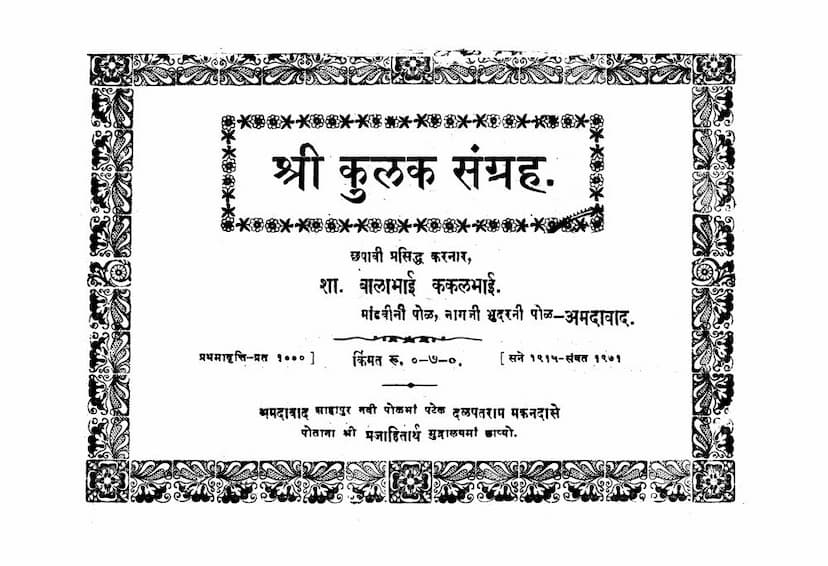Kulak Sangraha
Added to library: September 2, 2025

Summary
Here is a comprehensive summary of the Jain text "Kulak Sangraha" by Balabhai Kakalbhai, based on the provided pages:
Book Title: Kulak Sangraha (Collection of Chapters/Verses) Author: Balabhai Kakalbhai Publisher: Balabhai Kakalbhai Publication Year: 1915 (Saka Samvat 1971) Price: Rs. 0-7-0
Overall Purpose and Structure:
"Kulak Sangraha" is a compilation of seventy important chapters or verses compiled from the works of ancient Jain Acharyas. The book aims to present these verses in a single volume for the convenience of sadhus, sadhvis, shravaks, and shravikas who are eager to benefit from them. The author acknowledges the assistance and inspiration from various sources and individuals in bringing this collection to fruition.
Key Sections and Their Content:
The book is organized into various "Kulaks" (chapters or sections), each focusing on specific aspects of Jain philosophy, ethics, and practice. Here's a breakdown of some of the prominent Kulaks and their themes:
-
Gunanurag Kulak (Chapter on Love for Virtues): This is the introductory chapter, emphasizing the importance of appreciating and cultivating virtues in oneself and others. It highlights that a heart filled with love for virtuous individuals leads to spiritual attainment and that focusing on others' virtues is essential for spiritual progress. It also warns against jealousy and fault-finding.
-
Guru Pradakshina Kulak (Chapter on Circumambulating the Guru): This section is dedicated to the reverence and adoration of Gurus. It expresses the profound impact of a Guru's darshan (sight), equating it to the darshan of ancient great monks and ascetics. It emphasizes how the Guru's guidance can bring fulfillment, remove difficulties, and lead to spiritual awakening.
-
Punya Kulak (Chapter on Merit/Good Deeds): This chapter illustrates the positive outcomes of good deeds and the accumulation of merit. It shows how good deeds can lead to the acquisition of various favorable circumstances and experiences.
-
Dan, Sheel, Tap, and Bhavana Kulaks (Chapters on Charity, Conduct, Austerity, and Devotion): These chapters delve into the significance and glory of the fourfold pillars of Jain dharma: charity (Dan), virtuous conduct (Sheel), austerity (Tap), and pure devotion/meditation (Bhavana). They often include examples of great souls who embodied these virtues and served as role models.
-
Abhavya Kulak (Chapter on the Unworthy/Non-Evolved Souls): This section describes the qualities that "Abhavya" (souls not destined for liberation in this era or disposition) do not possess. It contrasts these souls with those who are on the path to spiritual liberation.
-
Punya Pap Kulak (Chapter on Merit and Demerit): This chapter highlights the consequences of performing religious actions versus indulging in sinful conduct, explaining the benefits of the former and the disadvantages of the latter.
-
Gautam Kulak (Chapter by Gautam Rishikrut): This section features valuable teachings and advice, likely emphasizing the benefits of virtues and the disadvantages of faults through insightful verses (gathas).
-
Atmabodha Kulak (Chapter on Self-Realization): Authored by Shrimat Jayashikhar Suri, this chapter offers profound insights into spiritual knowledge and self-realization.
-
Jivanushasti Kulak (Chapter on Discipline of the Soul): This chapter provides guidance and teachings for cultivating detachment from worldly existence.
-
Indriyadi Vikar Nirodh Kulak (Chapter on Restraining Sense Desires): This section focuses on the wisdom of controlling and restraining the desires and impulses of the senses.
-
Karma Kulak (Chapter on Karma): This chapter explains the fruits of karma and the consequences of one's actions, reinforcing the law of karma.
-
Dash Shravak Kulak (Chapter on Ten Lay Disciples): This chapter briefly describes the characteristics and virtues of the ten prominent lay disciples (Shravaks) in Jainism.
-
Iriyavahi Kulak (Chapter on Iriyavahi): This section involves the practice of "Iriyavahi" (mindful movement) and includes the concept of "Michchhami Dukkadam" (an apology or seeking forgiveness). The text mentions it uses detailed "bhangas" (aspects) to offer this apology.
Author's Motivation and Acknowledgments:
Balabhai Kakalbhai expresses his gratitude to individuals and groups who supported the publication. He specifically thanks:
- Sau. Ben Ratanben (wife of Seth Manibhai Dalpatbhai): Rs. 50/-
- Sau. Ben Motiben (wife of Seth Jagabhai Dalpatbhai): Rs. 50/-
- Saraswati Ben (daughter of Seth Dalpatbhai Maganbhai): Rs. 50/-
He also acknowledges the help received from books published by Shreyaskar Mandal, Ahmedabad Vidyashala, Master Bhogilal Tarachand, and others. Special thanks are given to Shri Kapurvijayji Maharaj Saheb for translating the Magadhi language Kulaks into Gujarati and to Panditji Sukhlalji and Bhagwandas Harkchand for their significant efforts in reforming and translating five specific Kulaks (Jivanushasti, Indriyadi Vikar Nirodh, Karma, Dash Shravak, and Iriyavahi).
Concluding Remarks and Request:
The author humbly requests forgiveness from the Chaturvidh Shri Sangh (fourfold Jain community) for any errors in the text that might have occurred due to oversight or proofreading mistakes. He advises readers to treat the book with reverence and read it with concentration and care.
Errata Sheet (Shuddhipatraka):
The book includes an errata sheet on page 5, listing corrections for typographical errors, incorrect spellings, and grammatical mistakes to ensure accuracy.
Advertisement Section (Jaher Khabar):
Page 6 and 7 contain advertisements for other Jain religious books published by the "Shri Adya Jain Dharma Pravartak Sabha." These include titles like "Jiv Vichar," "Nav Tattva," "Dandak," "Laghu Sanghiani," "Bees Sthanak Tap Katha Sangrah," "Bhashya Trayam," "Chaturvishati Jin Stuti Deshna Sangrah," "Jain Bol Sangrah (Parts 1 & 2)," and "Rasakar Pachisi, Atmabindha Ashtak."
Overall Significance:
"Kulak Sangraha" serves as a valuable resource for Jain scholars and practitioners, consolidating important philosophical and ethical teachings from various ancient sources into a single, accessible volume. It reflects the compiler's dedication to preserving and disseminating Jain knowledge.